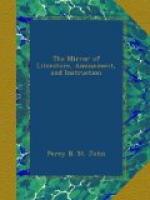* * * * *
HOLLAND.
Holland derives its name from the German word Hohl, synonymous with the English term hollow, and denoting a concave, or very hollow, low country.
This country originally formed part of the territory of the Belgae, conquered by the Romans, 47 years before Christ. A sovereignty, founded by Thierry, first Count of Holland, A.D. 868, continued till the year 1417, when it passed, by surrender, to the Duke of Burgundy. In 1534, being oppressed by the Bishop of Utrecht, the people ceded the country to Spain. The Spanish tyranny being insupportable, they revolted, and formed the republic called the United Provinces, by the Union of Utrecht, 1579. When they were expelled the Low Countries by the Duke of Alva, they retired to England; and having equipped a small fleet of forty sail, under the command of Count Lumay, they sailed towards this coast—being called, in derision, “gueux,” or beggars of the sea. Upon the duke’s complaining to Queen Elizabeth, that they were pirates, she compelled them to leave England; and accordingly they set sail for Enckhuysen; but the wind being unfavourable, they accidentally steered towards the isle of Voorn, attacked the town of Briel, took possession of it, and made it the first asylum of their liberty.
In 1585, a treaty was concluded between the States of Holland and Queen Elizabeth; and Briel was one of the cautionary towns delivered into her hands for securing the fulfilment of their engagements. It was garrisoned by the English during her reign, and part of the next, but restored to the States in 1616.
The office of Stadtholder, or Captain-General of the United Provinces, was made hereditary in the Prince of Orange’s family, not excepting females, 1747. A revolt was formed, but prevented by the Prussians, 1787. The country was invaded by the French in 1793, who took possession of it January, 1795, and expelled the Stadtholder: it was erected into a kingdom by the commands of Buonaparte, and the title of king given to his brother Louis, June 5, 1806. Its changes since this period are familiar to the reader of contemporary history.
Lord Chesterfield, in his Letters to his Son, says—“Holland, where you are going, is by far the finest and richest of the Seven United Provinces, which, altogether, form the republic. The other provinces are Guelderland, Zealand, Friesland, Utrecht, Groningen, and Overyssel. These seven provinces form what is called the States-General of the United Provinces: this is a very powerful, and a very considerable republic. I must tell you that a republic is a free state, without any king. You will go first to the Hague, which is the most beautiful village in the world, for it is not a town. Amsterdam, reckoned the capital of the United Provinces, is a very fine, rich city. There are besides in Holland several considerable towns—such as Dort, Haerlem, Leyden, Delft, and Rotterdam. You will observe throughout Holland the greatest cleanliness: the very streets are cleaner than our houses are here. Holland carries on a very great trade, particularly to China, Japan, and all over the East Indies.”




